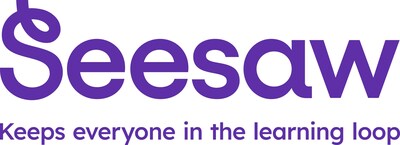New Report Finds 70% of PK-6 Teachers Believe Edtech Does Not Meet the Needs of Early Learners
PR Newswire
SAN FRANCISCO, Jan. 10, 2024
Elementary educational tools should be developed for elementary learners and align to principles of joyful, connected, and inclusive learning
SAN FRANCISCO, Jan. 10, 2024 /PRNewswire/ -- Seesaw, the global Learning Experience Platform designed for PK-6, today published Context Is Everything: Reimagining Edtech for Early Learners, a new report presenting insights from educators, thought leaders, and researchers on the role of edtech in elementary classrooms.
While edtech plays an increasingly important role in classrooms, the report spotlights the need for edtech tools designed for the types of learning experiences that educators, researchers and parents want for elementary students. In particular, based on a survey conducted for the report, over 70% of PK-6 teachers reported that the edtech tools they use in the classroom don't adequately meet the needs of early learners.
"The report highlights the mismatch between the needs of elementary classrooms and edtech tools, like Learning Management Systems, that were originally developed for older learners. This is not to say that tech resources in schools are not serving a purpose, but that the traditional approaches to edtech development and adoption need to be re-imagined to make them more effective for early learners," said Matthew Given, CEO of Seesaw. "The paper presents a vision for the future of edtech in elementary classrooms grounded in the core design principles coming out of learning and developmental science."
In addition to the survey of over 700 elementary teachers, and interviews with over 15 experts and researchers, the report's authors analyzed the trajectory of edtech development and adoption over the past few decades. The core findings span from developmental and learning sciences, and the affordances of existing and emerging technologies to identifying key principles to guide the selection of edtech tools by administrators and educators while informing the development of tools as well. The key design principles identified in the report are:
- Joyful Learning: Promote joyful, play-based learning: Edtech tools should spark curiosity, creativity, and hands-on exploration while balancing screen time with offline activities.
- Connected Learning: Facilitate connected learning: Tools should enable collaboration between students, teachers, and families by streamlining communication and sharing of student work.
- Inclusive and Divergent Learning: Support inclusivity and accessibility: Following universal design for learning (UDL) principles, edtech should empower all young learners by reducing barriers and providing multiple ways to engage.
Featuring a foreword by Michelle Kang, the CEO of the National Association for the Education of Young Children (NAEYC), the paper also includes contributions from researchers, district leaders and experts in early learning and education technology including Bo Stjerne Thomsen, Chair of Learning through Play and Vice President at the LEGO Foundation; Maggie Picket, Senior Technical Assistance Specialist, CAST; Sara Trettin, Senior Policy Advisor, U.S. Department of Education; Michael Preston, Executive Director, Joan Ganz Cooney Center at Sesame Workshop; and Dr. Sharon Shewsbridge, Director of Instructional Technology at Virginia Beach City Public Schools, among others.
"A partnership [between parents and teachers] really makes sense in those early years when there are usually fewer teachers," said Michelle Kang. "And if we can create tools to help facilitate that part of the partnership, it makes it even better for both the educator who's doing the work during the day, and for the parent who goes home; it's carrying it over. If something new was learned, then they can take the learning home and help build on it. In the end, most parents want to do whatever they can to help their children learn."
"When most people talk about edtech for early learners, it's all about the bells and whistles – but they always forget that there's a philosophical shift required in the ways edtech is deployed and used for younger children," said Dyane Smokorowski, Coordinator of Digital Literacy for Wichita Public School.
To learn more, read the full report here.
About Seesaw
Seesaw is trusted and loved by 25 million educators, students, and families worldwide and is the only elementary Learning Experience Platform that offers a suite of award-winning tools, resources, and curriculum for teachers to deliver joyful, inclusive instruction. Through interactive lessons, digital portfolios, and two-way communication features, Seesaw keeps everyone in the learning loop by providing continuous visibility into the student's learning experience to support and celebrate their learning.
![]() View original content to download multimedia:https://www.prnewswire.com/news-releases/new-report-finds-70-of-pk-6-teachers-believe-edtech-does-not-meet-the-needs-of-early-learners-302030959.html
View original content to download multimedia:https://www.prnewswire.com/news-releases/new-report-finds-70-of-pk-6-teachers-believe-edtech-does-not-meet-the-needs-of-early-learners-302030959.html
SOURCE Seesaw


